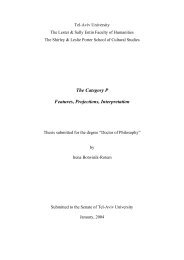Create successful ePaper yourself
Turn your PDF publications into a flip-book with our unique Google optimized e-Paper software.
TEL AVIV UNIVERSITY REVIEW<br />
Summer 2010<br />
coordinates what the body does,” she<br />
says. “It’s important for this interconnected<br />
structure to remain stable, as it<br />
forms a kind of railway system for materials<br />
to be transported among brain<br />
cells. What happens in schizophrenia<br />
is that proteins associated with this<br />
transport system may change, <strong>and</strong><br />
the stability of the system is then disrupted.”<br />
Gozes discovered a compound,<br />
called davunetide, that stabilizes the<br />
system <strong>and</strong> could potentially improve<br />
schizophrenic patients’ life skills.<br />
Allon Therapeutics, the Canadabased<br />
company which Prof. Gozes<br />
founded together with Ramot, TAU’s<br />
technology transfer company, is currently<br />
conducting clinical trials of<br />
the drug with substantial financial<br />
support from the National Institutes<br />
of Health (NIH) of the US. “If we<br />
succeed,” she says, “this could become<br />
the first approved treatment for<br />
cognitive impairment associated with<br />
schizophrenia.”<br />
Gozes sees no contradiction between<br />
her previous basic science work<br />
<strong>and</strong> its current, psychology-related<br />
outcome. “When you work on the<br />
molecular genetics <strong>and</strong> biochemistry<br />
of the brain,” she says, “you have to<br />
look at behavior because it represents<br />
the final outcome. You have to be able<br />
to connect the molecules to specific<br />
behaviors of human beings.”<br />
Beat the stress, beat the<br />
spread of cancer<br />
Everyone knows that, if you feel<br />
sick, stressing about it only makes it<br />
worse. But in what has proved to be a<br />
deadly link, says Prof. Shamgar Ben-<br />
Eliyahu, psychological <strong>and</strong> physiological<br />
stress responses to cancer surgery<br />
can contribute to the progression of<br />
metastasis.<br />
“Approximately 30 to 50 percent<br />
of colon cancer patients will have metastasis<br />
following surgery to remove<br />
Envisioning<br />
the Mind<br />
with MRI<br />
TAU is the largest center<br />
of neural imaging research<br />
in Israel.<br />
Many of the recent<br />
breakthroughs achieved<br />
at TAU were made possible<br />
by the university’s<br />
new MRI facility, which is<br />
supported by the Alfredo<br />
Federico Strauss Center<br />
for Computational<br />
Neuroimaging, the Raymond <strong>and</strong> Beverly Sackler Institute for Biophysics <strong>and</strong> the<br />
Israel Science Foundation. About 20 teams from five faculties – Social Sciences,<br />
Life Sciences, Exact Sciences, Medicine <strong>and</strong> Engineering – use the powerful <strong>and</strong><br />
non-invasive MRI to see what they were unable to see before: images of activity in<br />
various parts of the brain.<br />
“Our research is pushing the limits of MRI technology,” says Prof. Yoram Cohen<br />
of the Raymond <strong>and</strong> Beverly Sackler School of Chemistry, who spearheaded the<br />
initiative to build the facility, <strong>and</strong> who promotes MRI techniques as a cornerstone of<br />
neuroscientific research.<br />
“Yoram is ‘Mr. MRI’ on campus,” affirms colleague Gil Navon, a professor emeritus<br />
at the school. “He was the one who pushed for purchasing advanced experimental<br />
MRI equipment – <strong>and</strong> now the machine works day <strong>and</strong> night. People can barely find<br />
a time slot to use it.”<br />
Adds Dr. Yaniv Assaf , Cohen’s former PhD student: “The greatest power of the<br />
MRI unit is that it has united scientists from five disciplines under one roof, where<br />
they collaborate on important studies.” Assaf, the Director of the Strauss Center<br />
<strong>and</strong> recipient of the Sieratzki-Korczyn Prize for Advances in Neuroscience at TAU,<br />
is one of several new faculty recruits at TAU who were picked for their expertise in<br />
MRI. The wave of recruitment, he says, has turned TAU into a “powerhouse of neural<br />
imaging.”<br />
Just recently Prof. Cohen <strong>and</strong> Dr. Assaf established the CONNECT consortium for<br />
imaging brain connectivity together with 10 additional groups from the UK, Italy,<br />
Germany, France, Denmark <strong>and</strong> Switzerl<strong>and</strong>. The consortium received a grant of 2.4<br />
million euros for the two-year research program.<br />
tumors, <strong>and</strong> the majority of them will<br />
die,” says Ben-Eliyahu, who heads<br />
TAU’s Psycho-Neuroimmunology<br />
Laboratory <strong>and</strong> serves as Chairperson<br />
of the Department of Psychology.<br />
It begins in the brain, when the<br />
stress of surgery triggers the release<br />
of hormones like adrenaline, prostagl<strong>and</strong>ins<br />
<strong>and</strong> cortisol. These stress<br />
hormones suppress the immune system<br />
at the very moment when it is<br />
needed most, significantly increasing<br />
the likelihood that the cancer will<br />
spread. Additionally, these hormones<br />
directly affect the malignant tissue,<br />
promoting its growth <strong>and</strong> metastatic<br />
capacity.<br />
Ben-Eliyahu believes he has found<br />
a potential treatment: By blocking the<br />
release of the stress hormones with<br />
drugs administered before, during<br />
<strong>and</strong> after surgery, the rate of metasta-<br />
Prof. Yoram<br />
Cohen<br />
(left) with<br />
Dr. Yaniv<br />
Assaf in the<br />
experimental<br />
MRI facility<br />
at TAU<br />
5

















